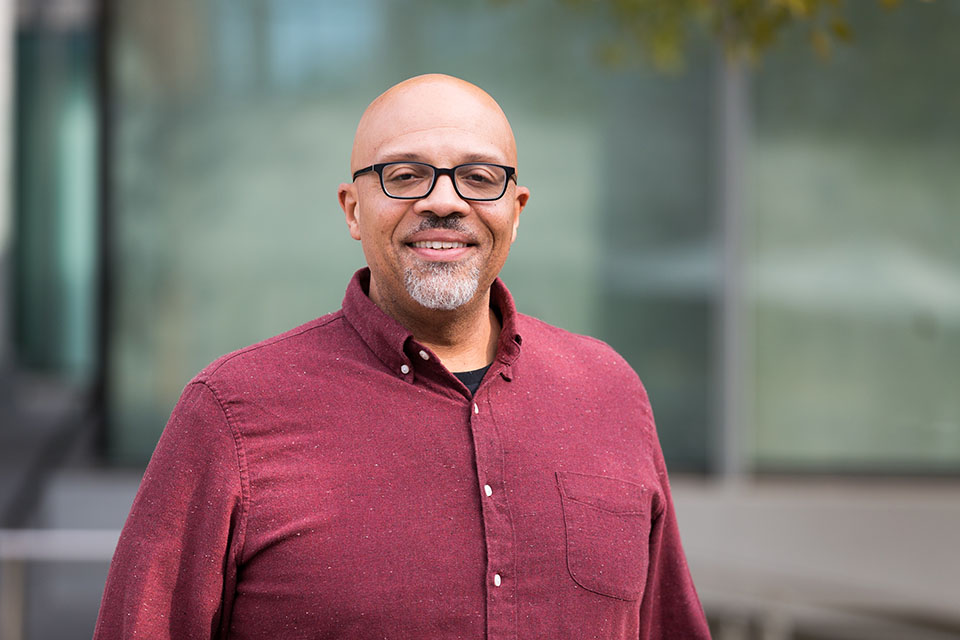
Professor of Mathematics Robin Wilson’s career is founded on the belief that “math literacy can be the key to unlocking the unlimited potential of disenfranchised communities.” While he was introduced to and interested in STEM education and support programs in his youth, his own challenging experience with calculus in high school became a catalyst for his desire to help more students of color at all ages have positive experiences with mathematics.
In 2022, Wilson was a recipient of the Mathematical Association of America’s Deborah and Franklin Tepper Haimo Award, which honors university professors who are widely viewed as extraordinarily successful and whose teaching effectiveness is proven to have influence beyond their own institutions. He was nominated for this honor by a group of his colleagues and is recognized for being an exemplary classroom instructor and selfless mentor; he is a builder and facilitator of programs that address the mathematical pipeline from K-12 through post graduate education; and he is a tireless educator who transforms the culture of mathematics to one that values diversity and acts inclusively and equitably to allow all to flourish.
He maintains an active research program in low-dimensional topology (the study of malleable shapes), with an emphasis on 3-manifold topology, knot theory, and graph theory. Knot theory is closely related to the study of 3-manifold topology and involves the study of mathematical properties of 3-dimensional spaces. On the non-theoretical side, this research has applications in the linking of DNA molecules and other molecular structures that arise in chemistry and biology. There are also applications within statistical mechanics, quantum computing, and physics.
“In addition to being a mathematician, another big part of my identity, if you will, is staying committed to social justice issues,” said Wilson. “I had these goals in mind when I began my career and becoming a professor at Loyola Marymount University was attractive because of the opportunity to keep pursuing both my interest in mathematics education and advocacy for social justice and equity.”
Wilson has worked with the Algebra Project, Inc. since 2001 both on a national level and locally in Los Angeles. “I was exposed to the Algebra Project through the book ‘Radical Equations: Civil Rights from Mississippi to the Algebra Project’ by Robert Moses and Charles Cobb, and soon after began working with the Project as a graduate student,” Wilson said. “The nonprofit’s mission focusing on the fundamental right to a quality education and math literacy for all children was empowering to me. It was very inspiring to see that my work as a mathematician and educator was connected to the larger struggle of marginalized people in the U.S. and around the world.”
Wilson’s teaching philosophy is centered around his belief that “all students’ ability to learn math is at a high level.” In the classroom, his teaching focuses on inquiry and collaboration, while also helping to center students in their individual voices as part of their mathematical identity building.
Prior to joining Loyola Marymount University in 2022, Wilson was a professor of mathematics at California State Polytechnic University, Pomona, where he also collaborated with professors from three California State University campuses to implement a flipped classroom curriculum, funded by a First in the World Grant. The program was designed to nurture a supportive STEM faculty community to drive change in teaching and learning through innovative practices.
He earned a Ph.D. at the University of California, Davis, a master’s degree from Howard University, and a bachelor’s degree (all in mathematics) from the University of California, Berkeley. He has received numerous accolades for his work including the 2018 Black History Month Honoree by the Network of Minorities in Mathematical Sciences.
In his free time, the dedicated father of two young children embraces family time and supporting his son’s and daughter’s activities and interests. He also enjoys listening to music and watching films if time permits.








